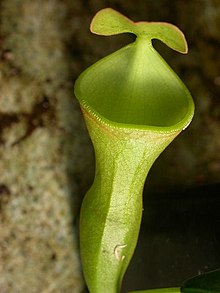Nepenthes campanulata
| Nepenthes campanulata | |
|---|---|
 |
|
| N. campanulata. Cultivated plant. | |
| Scientific classification | |
| Kingdom: | Plantae |
| (unranked): | Angiosperms |
| (unranked): | Eudicots |
| (unranked): | Core eudicots |
| Order: | Caryophyllales |
| Family: | Nepenthaceae |
| Genus: | Nepenthes |
| Species: | N. campanulata |
| Binomial name | |
|
Nepenthes campanulata Sh.Kurata (1973) |
|
Nepenthes campanulata (/nᵻˈpɛnθiːz kæmˌpænjuːˈlɑːtə/; from Late Latin: campānulātus "bell-shaped"), the bell-shaped pitcher-plant, is a tropical pitcher plant native to Borneo. It has also been reported from Palawan, the Philippines, though further field work is needed to confirm this identification.
Forest fires destroyed the only known population of N. campanulata in 1983 and it was uncertain whether the species had survived elsewhere or was in fact extinct. It was rediscovered in 1997, several hundred kilometres from the type locality. Nepenthes campanulata is listed as Vulnerable on the 2014 IUCN Red List of Threatened Species.
Nepenthes campanulata has no known natural hybrids. No infraspecific taxa have been described.
Nepenthes campanulata was first collected on 9 September 1957, on Mount Ilas Bungaan by A.J.G. 'Doc' Kostermans, the head of the Botanical Division of the Forestry Research Institute at Bogor, on the same expedition in which he collected the type material of N. mapuluensis. Kostermans wrote the following account of his discovery:
...
Wikipedia

